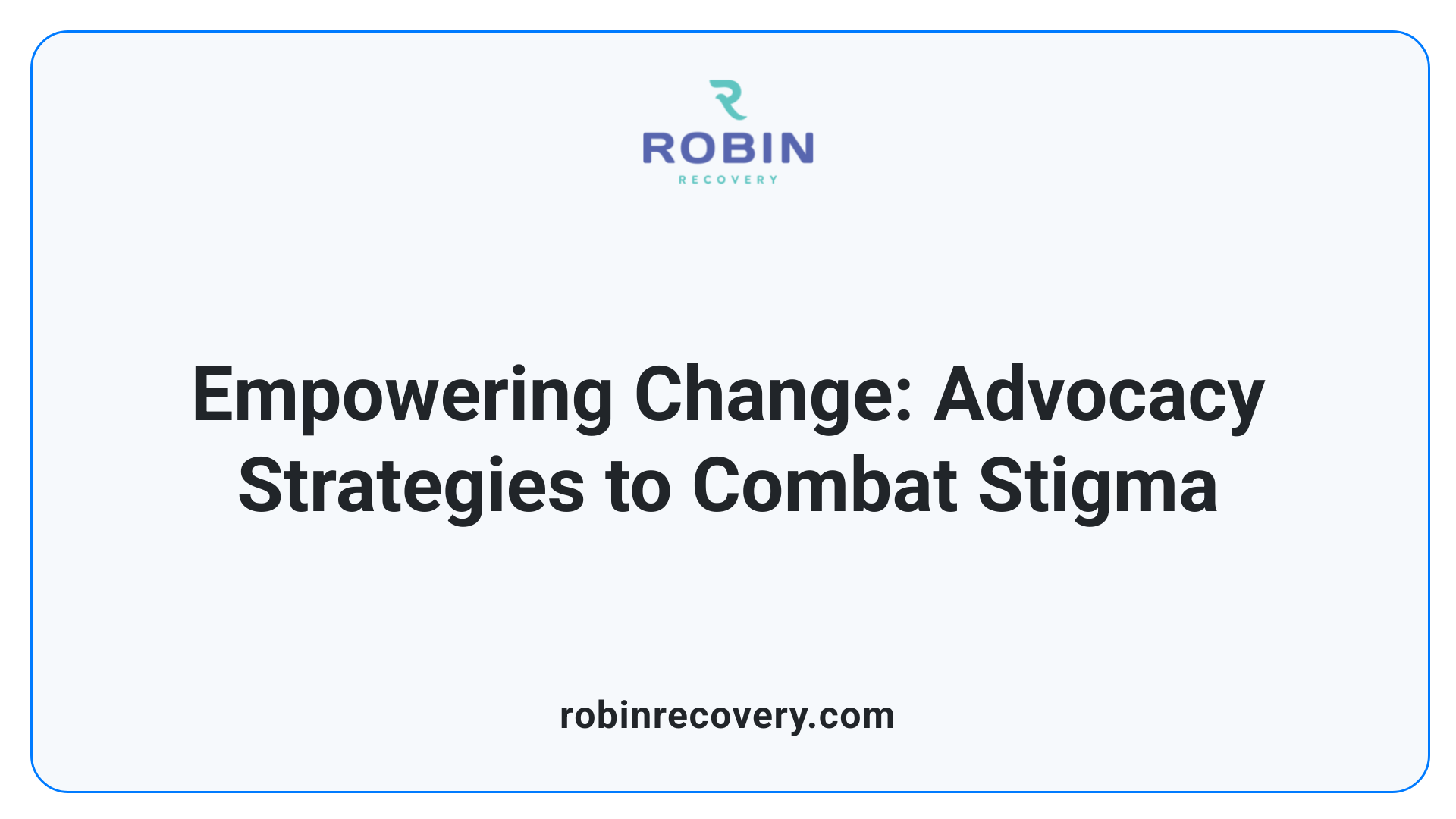The Importance of Advocacy in Breaking Addiction Stigma

Understanding the Power of Advocacy
Addressing addiction stigma is crucial for improving access to prevention, treatment, and recovery support for individuals grappling with substance use disorders (SUDs). Traditionally viewed from a moralistic standpoint, addiction has long been shrouded in societal misconceptions and punitive judgments, impacting how individuals with SUDs are perceived and treated. Advocacy plays a pivotal role in shifting these perspectives, promoting a culture of understanding, acceptance, and support. This article explores the importance of advocacy in challenging and dismantling addiction stigma, with a focus on education, personal storytelling, and legislative change.
The Historical Context of Addiction Stigma

What is the history of addiction stigma?
The history of addiction stigma is deeply rooted in societal beliefs and practices that have evolved over time. Initially, addiction was framed within moral and character failings, particularly during the Prohibition era, which heightened perceptions of addiction as a personal deficiency rather than a health issue. This era established a narrative that magically tied addiction to immorality, leading to discrimination against those with substance use disorders (SUDs).
The War on Drugs in the 1980s and 90s further embedded punitive attitudes toward addiction, reinforcing stigma and marginalizing individuals seeking help. During this time, aggressive law enforcement policies prioritized criminalization over treatment, propagating the idea that addicts were criminals rather than patients in need of care.
Historical events, such as the misuse of opiates during the Civil War and the establishment of inebriate homes in the early 1900s, contributed significantly to systemic stigma. These factors oppressed individuals with addiction issues, isolating them from mainstream healthcare and exacerbating feelings of guilt and shame attached to their conditions.
Despite growing awareness and public support for treatment, stigma continues to impact access to care. As a result, there remains notable treatment disparities and negative health outcomes for those affected by addiction today. The challenge of reframing addiction as a medical condition rather than a moral failing persists, but advocacy efforts aim to shift these narratives toward compassion and understanding.
Impact on treatment and policy
The marginalization of addiction in the healthcare system directly influences policies related to treatment. Even with advancements in understanding addiction as a complex brain disease, many healthcare policies still reflect outdated, stigma-laden perspectives. Individuals continue to face barriers in accessing equitable care for SUDs, emphasizing the urgent need for reform in public health approaches and language used around addiction.
Strategies for Effective Advocacy Against Addiction Stigma

Public Education and Awareness
Education plays a pivotal role in changing perceptions around addiction. Public awareness campaigns can dispel myths, highlight that addiction is a complex health issue rather than a moral failing, and promote accurate narratives. It is crucial to use person-first language such as "person with a substance use disorder" instead of identifying individuals by their condition. By fostering understanding and compassion, advocacy groups can encourage open dialogues about addiction, reducing societal stigma.
Legislative Advocacy and Policy Change
Legislative efforts are essential in addressing addiction stigma and ensuring equitable access to treatment. Support for policies such as the Wellstone-Domenici Mental Health Parity and Addiction Equity Act demonstrates a commitment to fair treatment options. Advocating for comprehensive legislation can enhance insurance coverage for addiction treatment, making services more accessible. Collaborating with organizations dedicated to legislative change can amplify the impact of these efforts and ensure marginalized communities receive necessary resources.
Role of Personal Narratives
Personal stories of individuals in recovery are powerful tools in the fight against stigma. Sharing experiences can humanize addiction, fostering empathy among the wider public. Advocacy efforts that include testimonials reinforce the message that seeking help demonstrates strength, not weakness. Incorporating storytelling into campaigns can challenge misconceptions, highlighting the journeys of recovery while reducing feelings of shame and isolation experienced by many suffering from substance use disorders.
Strategy Description Impact Public Education and Awareness Campaigns that reshape perceptions on addiction Decrease stigma and promote understanding Legislative Advocacy and Policy Support laws enhancing treatment access Ensure equitable care and coverage for addiction Role of Personal Narratives Sharing recovery stories to foster empathy Challenge stigma and promote a culture of support
The Role of Cultural Awareness in Treating Addiction

Why is cultural awareness important when treating addiction?
Cultural awareness is crucial in treating addiction because it profoundly shapes clients' experiences and responses to treatment. Clinicians who understand diverse cultural backgrounds are better equipped to tailor their approaches, which improves both the utilization and effectiveness of treatment—especially for ethnic and racial minority groups.
Many subpopulations face unique barriers to accessing high-quality care. These barriers include stigma, discrimination, and socioeconomic challenges that may hinder effective treatment for individuals struggling with substance use disorders.
Moreover, cultural competence involves recognizing and respecting clients' cultural identities. When treatment providers create a more supportive and responsive environment, they not only foster trust but also empower individuals to engage more deeply in their recovery processes.
Barriers faced by diverse populations
Cultural stigma can significantly impede the willingness of individuals from various backgrounds to seek help. This stigma is often compounded by experiences of discrimination in healthcare settings, which discourages treatment-seeking behavior.
Socioeconomic factors, including limited access to resources and healthcare disparity, can further exacerbate the challenges faced by diverse populations. Hence, outreach and support tailored to specific community needs are essential.
Improving treatment outcomes through cultural awareness
Integrating cultural awareness into addiction treatment is key to addressing disparities in healthcare. Research has demonstrated that culturally informed care leads to better engagement and enhanced recovery outcomes.
Educational initiatives targeting clinicians can foster greater cultural competence, ensuring larger groups of individuals feel understood and respected. By actively involving community members in the dialogue regarding addiction, we can create a more inclusive approach that is beneficial for everyone, ultimately improving public health outcomes.
Initiatives and Best Practices in Addiction Advocacy

Advocacy Strategies and Best Practices
Effective advocacy for drug addiction encompasses several strategies aimed at breaking down stigma and improving access to care.
- Self-advocacy: Individuals impacted by addiction educate themselves on the nuances of substance use disorders, enabling them to communicate their needs effectively to healthcare providers.
- Public education: Engaging in open discussions about addiction helps dissipate myths and fosters a deeper understanding of the issue.
- Political advocacy: Writing to legislators to support recovery programs and policies that reduce stigma is vital. This action not only promotes awareness but also influences vital funding decisions.
- Community engagement: Building supportive networks through local organizations amplifies awareness and provides ongoing support for recovery efforts.
- Harm reduction strategies: Supporting a public health approach to addiction fosters comprehensive care and recognizes the importance of reducing harm while encouraging recovery.
Examples of Successful Advocacy Initiatives
Organizations dedicated to advocating for individuals with substance use disorders have made significant strides in reducing stigma through:
- Storytelling campaigns: Many organizations encourage individuals to share their recovery stories, helping to humanize addiction and foster public empathy.
- Legislative efforts: Initiatives like the Mental Health Parity and Addiction Equity Act have successfully advocated for equal insurance coverage for addiction treatment, democratizing access to necessary services.
Role of Advocacy Organizations
Dedicated advocacy organizations, such as the American Academy of Addiction Psychiatry, play a critical role in:
- Education initiatives: They promote enhancing knowledge among healthcare providers about addiction as a medical condition rather than a moral failing.
- Community outreach: Increasing interaction between individuals affected by addiction and the community fosters understanding and reduces stigma.
Through these strategies and initiatives, advocacy for addiction not only addresses the stigma associated with substance use disorders but also ensures individuals are afforded the dignity and respect necessary for recovery.
Challenging Addiction Stigma: Language and Perception

Impact of Stigmatizing Language
Stigmatizing language in the context of addiction can significantly worsen perceptions and treatment experiences for individuals with substance use disorders. Terms like "junkie" or "abuser" dehumanize those affected, reinforcing negative stereotypes. This language can create barriers to care, as healthcare providers may internalize these misconceptions, leading to inadequate treatment and discrimination. Furthermore, societal attitudes shaped by this language can foster feelings of shame and guilt among individuals seeking help.
Strategies to Promote Non-Stigmatizing Language
Promoting non-stigmatizing language involves adopting person-first terminology, which emphasizes the person's humanity over their disorder. For example, referring to someone as "a person with a substance use disorder" rather than labeling them as an "addict" can make a meaningful difference. Additionally, educational initiatives that focus on the medical understanding of addiction—as a chronic disease—can reshape public perception and encourage compassionate views. Effective strategies also include community workshops and media campaigns that clarify addiction's complexities, encouraging discussions that promote empathy and understanding.
Words Matter Pledge
The Words Matter Pledge is an initiative encouraging individuals and organizations to commit to using respectful language when discussing addiction and recovery. By fostering an environment of understanding and reducing stigmatizing terms, this pledge aims to create a supportive atmosphere for those affected by addiction. Advocacy groups are encouraged to implement such pledges within their communities to raise awareness about the impact of language and promote consistent usage of non-stigmatizing terms. Collective efforts to embrace respectful language can change narratives and significantly reduce stigma associated with substance use disorders.
Empowering Communities: Steps to Break Down Stigma
What are some effective ways to break down the stigma of addiction?
Breaking down the stigma surrounding addiction requires a multifaceted approach that involves community advocacy and education. One proven strategy is the use of "person-first" language; for instance, referring to someone as "a person with a substance use disorder" rather than "an addict" emphasizes their humanity and can shift public perception.
Educating both the community and healthcare providers about addiction as a chronic illness is essential. Understanding that addiction can affect anyone helps dissipate the misunderstanding that it is a moral failing.
Initiatives such as the Words Matter Pledge advocate for compassionate language when discussing individuals struggling with substance use issues. This encourages respectful communication and fosters empathy, reducing systemic stigma.
Community involvement in advocacy
Community involvement is a crucial element in combating stigma. Local advocacy groups can organize awareness campaigns that educate the public on substance use disorders, presenting facts and personal stories that illustrate recovery journeys. Additionally, hosting events that celebrate recovery can foster a sense of belonging and community support for individuals affected by addiction.
Support networks and resources
Creating and promoting support networks is vital in this endeavor. Connection with others who are in recovery or are supportive of those in recovery significantly decreases feelings of isolation. Resource centers can provide crucial information and networking opportunities for those seeking treatment and coping strategies.
Encouraging open dialogue
Finally, encouraging open dialogue within communities about mental health and addiction helps normalize conversations around these topics. This can take the form of public forums, workshops, or social media dissemination focusing on sharing experiences and educating others. By discussing addiction openly, communities can dismantle harmful stereotypes and promote a culture of acceptance.
The Path Forward: Advocacy and Transformation
Breaking the stigma surrounding addiction is more than an individual or isolated effort; it requires collective engagement and proactive advocacy. By educating the public, transforming language, and implementing supportive policies, advocates can help create a more empathetic and accessible treatment landscape for those affected by addiction. Community involvement is vital in sustaining these efforts, reinforcing that individuals with substance use disorders are integral members of our society deserving of compassion and appropriate care. As advocacy initiatives continue to bridge gaps in understanding and treatment access, a hopeful path towards destigmatization and recovery emerges.
References
- Addressing the Stigma of Addiction | Advocacy - Hazelden Betty Ford
- Advocate for Change - Partnership to End Addiction
- Supporting Addicted Populations Through Advocacy
- Breaking the Stigma of Addiction: Fostering Recovery Through ...
- Advocacy and Public Policy Efforts of the American Academy of ...
- Breaking the Stigma: The Power of Mental Health and Substance ...
- 10 Ways You Can Break the Stigma of Addiction - Valley Hope
- Understanding Substance Use Disorders: Breaking the Stigma and ...
